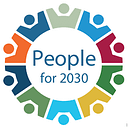Dismantling stigma and breaking the glass ceiling
Meet Gift Govere, a Project Officer for UNDP/UNV Talent Programme for Young Professionals with Disabilities in Zimbabwe, who shares how UNDP has provided an inclusive environment in which he can participate and make a meaningful contribution.
When I got the opportunity at UNDP in 2019, I was working at the university as a teaching assistant. I thought UNDP would give me a chance to grow and also contribute to everything that I wanted to do in society. I was already interested in inclusive development, inclusive governance, social justice, climate change, and I wanted to play a part in addressing social inequalities.
Working for UNDP, for me, is about breaking certain stigmas and stereotypes that are there in society that tell me “You can go this far, but you cannot go further than this.” Then, it was also about what I was seeing in society. Yes, some of the challenges were directed to me, but some of it is about listening to other people’s stories. You start to appreciate the challenges and barriers faced by the marginalised groups in society. And you start to wonder, how can you be the change that you want to see in society at the end of the day? That drives my passion.
Inclusion from day one
UNDP was an inclusive environment from the start. I was asked from the first day, “What do you need, as part of reasonable accommodation; How can we make the environment more accessible and enabling for you?” For example, I have low vision so when I’m using my computers at times I prefer to use those big screens so that I can easily see things.
One key strategy we work on in the Talent Programme for Professionals with Disabilities is enhancing the participation or inclusion of persons with disabilities within the organisation. When I first joined UNDP, I was working under the United Nations Partnership on the Rights of Persons with Disabilities. My focus was to support UNDP, especially the Governance and Peacebuilding Unit, to be more disability-inclusive in its programming. We can’t keep on saying we are doing development that is inclusive without having persons with disabilities driving that agenda and working towards the Agenda 2030.
Lifting up marginalised groups
Here in Zimbabwe, we do a lot of capacitation on the inclusion of marginalised groups or persons with disabilities. When you capacitate and increase the knowledge of staff, you enable a better understanding. Without that training it’s hard to know, how do you engage someone with a disability? How do you operationalise disability-inclusive programming?
One project I have been working on is the Spotlight Initiative. If you look at the Zimbabwean context, women and girls are one of the most vulnerable and left-behind groups. The Spotlight Initiative focuses on promoting gender equality, addressing violence against women and girls and promoting reproductive health and rights.
I also look at issues to do with access to justice for marginalised groups. Access to justice for marginalised groups comes with a cost, in monetary terms, but also in terms of relationships with society and family members. Persons with disabilities still face a plethora of barriers, stereotypes, stigma and discrimination in accessing justice, services and effective participation in society. Some of the rampant barriers, stereotypes and stigma are entrenched in and exacerbated by cultural beliefs, cultural practices, traditional ways of life.
I also work on issues to do with policy and legislative frameworks where we are promoting the alignment of laws in the country to the constitution, and more specifically the United Nations Conventions on the Rights of Persons with Disabilities. Focus is also rendered on capacitating women and girls with disabilities to participate in law and policymaking processes effectively and meaningfully in the country.
For me, it is important that the contributions that we are doing now have an impact on the current and future society. Our contribution should change the lives of marginalised groups and ensure their participation and contribution to national development processes and the Agenda 2030.
There are some forums where I once thought, “Okay, will I ever be in the same room with a certain minister?” or asked myself, “Will I ever have a direct channel with certain directors within the ministry? Will I ever have an opportunity in my lifetime to present in front of various state officials?” But now I am meeting with these high-level people, participating in issues to do with the promotion of disability rights, policy formulation and inclusive development.
“If I can be included, accepted and contribute meaningfully in a certain space, what can stop the next person from doing the same? We can all play a critical role in ensuring an inclusive and accessible society for all.”
